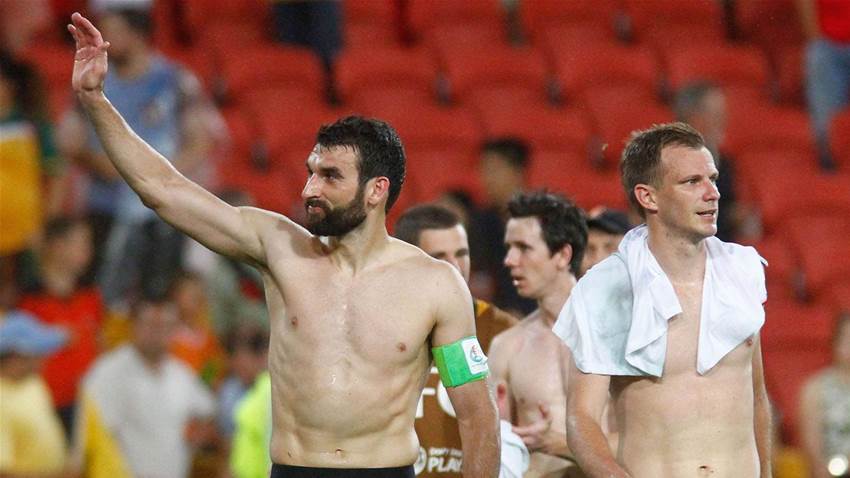Socceroos, Matildas, A-League and W-League stars have come out in support of the proposals outlined in the new blueprint for Australian football that's been sent to FIFA.
The Australian Congress Review Working Group had been charged by FIFA and the AFC with drawing up a new membership policy for the FFA congress, which is currently just nine state federations and one club representative.
Key stakeholders in Australian football like A-League and NPL clubs, fans and players, feared the system was being manipulated by FFA figures like CEO David Gallop and chairman Steven Lowy to pursue their agenda.
But the working group - chaired by Judith Griggs - has come back with a comprehensive overhaul of not just congress but the entire structure of Australian football.
It includes a plan for a spin off organisation to manage the A-League, W-League and Y-League and a vastly increased representation for women and players.
It also creates a pathway for special interest groups to be part of the FFA congress, and demands much greater transparency from the FFA on accounts and spending.
Today the changes were hailed by players and administrators.

Greg Griffin, Chairman of Australian Professional Football Clubs Association said: “This report and its recommendations represent an opportunity for a new era of collaboration, transparency and democracy for Australian Football.
"They are borne from a process of unprecedented cooperation and engagement between the diverse stakeholders of our game – interactions that should be given every chance of becoming the cornerstone of a brighter future for the entire game."
Sydney FC defender, Socceroo and PFA president Alex WIlkinson added: "I’ve been part of the A-League since the very first season and seen it evolve.
"There was a time when we needed absolute support but the competitions – both the A-League and the W-League – are now ready and mature enough to step out on their own.
"What this report has proposed is a plan to ensure all areas of the sport will be stronger.
"Not only the professional leagues, but also the national teams and development pathways; as each stakeholder will be able to contribute to building the league and then focusing on their own areas of expertise.”
The four CRWG Member Federation representatives (New South Wales, South Australia, Victoria and Western Australia) said “It gives us tremendous pride to commend the CRWG Report to the Australian football public.
"We believe the CRWG Report provides the architecture for a comprehensive and robust governance framework that will faithfully serve the complexity of stakeholders and forge a unity of purpose for Australian football to achieve its aspirations."
Socceroo skipper and former A-League veteran Mile Jedinak added: "I know how lucky I have been to have experienced every part of football in Australia.
"From being a part of a community club to the professional game then having the honour of captaining our country at the World Cup. To me, the strength of football in Australia is its community. If we can build our sport, in a unified way, tying together everyone’s knowledge and passion, there’s no limit to what we can achieve.
"This model is the first step toward achieving that ambition – not only because its inclusive but the fact it has been developed by harnessing the knowledge of so many different people across our game – from grassroots clubs, to supporters, to professional teams to state federations to the players."

Matildas keeper Lydia Williams added: "I think the report ensures that everybody within the game now has a voice and is accountable to each other which, in the long term, can only be a positive as it will force us to get better.”
And former Matildas skipper and PFA deputy chief executive Kate Gill added: "Having played around the world for so long, I’ve seen first-hand the opportunities available to women’s football, but also the leadership opportunities that need to be available women in football.
"The report does a great job of promoting these areas and ensuring that developing women’s football is done authentically and seen as an investment in building the entire sport across the country.”
But the report was dismissed by Football Supporters Australia who had submitted to the working group.
The blueprint creates a pathway for them to join the Congress model after a set period of time, effectively to prove their long-term commitment and unity as a representative group.
But after the report's publication, the FSA tweeted: "This is far too weak & broad - fans are not just another SIG, arguably the largest stakeholder group in football, which inc at least tens of thousands of grassroots volunteers who make up a large proportion of fans who attend games of @ALeague @WLeague #NPL and national teams etc."
Related Articles
.jpeg&h=172&w=306&c=1&s=1)
Spurs assistant Mile Jedinak reveals coaching future
.jpeg&h=172&w=306&c=1&s=1)
Matildas goalkeeper injured as Western Utd beat Victory
.jpeg&h=172&w=306&c=1&s=1)













